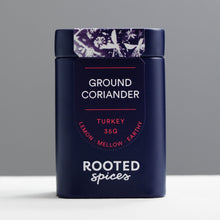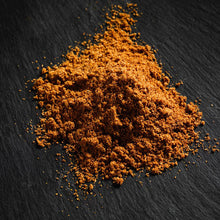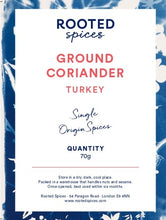- INFO
- WHERE
- STORAGE
- HEALTH
When used as a fresh herb, punchy coriander divides opinion – but the plant’s dried seeds have a subtle quality, which introduce earthy-sweet, lemon notes to dishes. Though coriander is a bass note spice rarely used in isolation, that’s no reason to overlook its importance – a quality coriander can be a game-changer.
The advantage of pre-ground coriander is that it’s quick and easy to use. Put a pinch over flatbread, stir it into a yoghurt-based dip, or toss a teaspoon through roast chickpeas. Ground coriander is one of the most frequently used spices in a cook’s collection – and although freshly-grinding your own seeds guarantees the best flavour, speed is often an asset in the kitchen.
Ground coriander seeds are used in dishes worldwide – from a harissa spice mix to a garam masala. We love adding a dash to yoghurt dips, or mixing with honey, lime and chilli for a quick barbecue marinade. We’ve also been won over by chef Claire Ptak’s ginger snaps which use a dash of coriander: “there's a sourness and a freshness that works really well in sweet stuff”.
ALSO KNOWN AS: Cilantro, Coriandrum sativum, dhania, kişniş
Coriander is a relatively new addition to the aromatic plants which are cultivated in the Turkey, but it has the perfect climate (traditionally India and Iran have been top producers) – and I think that you'll agree we've tracked down a great supply of aromatic ground coriander.
Ground coriander should be stored in a dark, airtight container, to prevent it from fading in the sunlight and losing its potency.
Coriander is widely used in parts of the world for its health benefits. Research has shown that coriander may be a useful anti-diabetic, helping to maintain healthy blood sugar levels. For more information, click HERE. Coriander is also thought to possess antimicrobial, antioxidant and detoxifying properties. For more information, click HERE. In Ayurvedic Medicine, coriander is believed to ease digestion, and help stomach related ailments.






